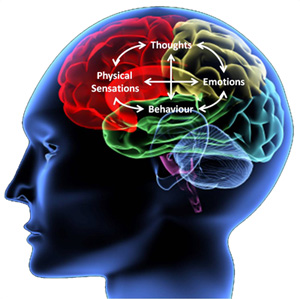
Source: mashable.com
Einstein defined insanity as doing the same thing over and over again and expecting different results. Makes a lot of sense. The problem is that habits and patterns can become so ingrained, it’s hard to see a way out, a different way of living or being. I think this is the source of a lot of my sadness, frustration, anxiety, depression, and general feelings of hopelessness. I get caught up in feeling like my actions are futile and my emotions are uncontrollable and this leads to the same catastrophic conclusion–there’s no point. There’s no point, no hope, no escape from these horrible feelings.
I’m trying to change. I’m in a twelve-week cognitive behavioural therapy program for people with social anxiety. I’m learning new skills that hopefully will help me, and I’m trying to change my perception. As part of this group, we were asked to purchase the book Mind over Mood, and we’ve been assigned a few chapters so far. What I’m gathering from all of this is the power of my own thoughts to determine the situation, my mood, my reaction.
Someone once said to me ‘jealousy is a distortion of reality’. I thought that was pretty profound. I’ve fallen ‘victim’ to feelings of jealousy many a time in my life. I even read an entire book called ‘Romantic Jealousy’ to try to figure out what the hell was wrong with me. Well, somehow, none of that helped as much as that one phrase. That’s exactly what my jealousy most often was–a distortion of reality by my mind. I’d take a situation and have so many automatic thoughts about it–all negative–that I wound up feeling jealous, enraged and mostly, quite hopeless.
I think this is the crux of the problem. I have so many automatic negative thoughts that swarm my mind I’m not even aware of them. I take them as truths. As facts. As ‘reality’. When really, they are perceptions, interpretations, ideas I have conjured, not facts I have witnessed or absorbed.
The main focus of the last few sessions of my CBT group was learning how to fill out a thought record. Basically, you think of a time you experienced a very strong mood or emotion (we’ve just started doing this, but really you should fill out a thought record right after/during an emotionally charged event). The thought record contains a description of the situation you were in, the moods you experienced with a rating of how strongly you experienced them, the automatic thoughts that came to mind, and then evidence for and against each of these automatic thoughts. The idea is that after compiling the evidence for and against, you can form either an alternative view of the situation, or a more balanced view of the situation that takes into account all of the evidence (rather than focusing on our negative perceptions/interpretations which we are apt to do).
This is different from positive thinking or rationalization in the sense that you are not trying to convince yourself of something positive or dismiss what you’re feeling–you’re actually trying to find facts that both support and counter your thoughts in order to have a more accurate or balanced view. This is just my summary based on reading the relevant chapters in the book. To learn more I recommend either getting the book or consulting Google. Anyways, the idea is that after filling out thought records 20-50 or so times, this way of thinking will become a lot more automatic and you won’t even need to write things down–you will have learned a more adaptive and beneficial way of thinking about your situation.
I can see the merit in this approach and I guess for me it’s just a matter of doing it–of actually filling out the thought records and exploring those automatic thoughts that pop into my mind. It’s pretty awful what lurks there and quite disturbing when you actually stop to take a look. There’s a part of me that very strongly doubts and hates myself. I see myself as an annoying burden to my family and friends, I see the negative side to things as much as possible. Someone’s tone or a look on someone’s face always signals disgust, repulsion, dislike–that person hates me. But how do I know these things? I don’t. And thinking of actual evidence, in terms of facts, like what someone actually said to me, really helps to shed light on this.
It just makes me wonder why do I have so many negative automatic thoughts? People are so weird. Our brains are so weird. What’s the adaptive advantage of catastrophizing and being so negative? There really isn’t one. But I guess that’s besides the point. What matters is that I start to gain awareness of my thoughts, to eventually have more balanced thoughts and not feel so awful and distressed by various situations.
Like now. I’m in a relationship with someone I really like, and I already feel myself falling into awful old patterns, out of fear. I’m sort of mentally pushing him away, convincing myself he doesn’t care about me, doesn’t make time for me, is too different from me. In reality, I really like him, to a point where I think it sort of scares me. But I find myself spiraling into negative thoughts and negative self thoughts. I compare myself to him and feel crappy. Why do I do these things? I really like him and he makes me happy yet that terrifies me.
I’m still working on sorting all this out but I’m hoping that by managing to understand my thoughts, to be aware of them and to try to look at the actual evidence that either supports or disproves my thoughts, I will learn a more adaptive way of thinking so that I can not only cope with these emotions, but actually enjoy my life, and allow myself to fully experience it.





